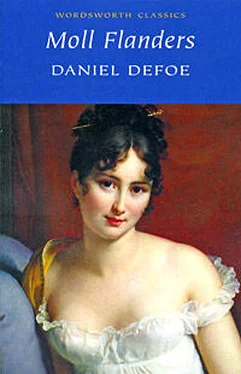Indeed, the captain had assurance enough of our resolutions to go, for that having made such provision to settle there, it did not seem rational that we would choose to remain here at the expense and peril of life, for such it must have been if we had been taken again. In a word, we went all on shore with the captain, and supped together in Gravesend, where we were very merry, stayed all night, lay at the house where we supped, and came all very honestly on board again with him in the morning. Here we bought ten dozen bottles of good beer, some wine, some fowls, and such things as we thought might be acceptable on board.
My governess was with us all this while, and went with us round into the Downs, as did also the captain's wife, with whom she went back. I was never so sorrowful at parting with my own mother as I was at parting with her, and I never saw her more. We had a fair easterly wind sprung up the third day after we came to the Downs, and we sailed from thence the 10th of April. Nor did we touch any more at any place, till, being driven on the coast of Ireland by a very hard gale of wind, the ship came to an anchor in a little bay, near the mouth of a river, whose name I remember not, but they said the river came down from Limerick, and that it was the largest river in Ireland.
Here, being detained by bad weather for some time, the captain, who continued the same kind, good–humoured man as at first, took us two on shore with him again. He did it now in kindness to my husband indeed, who bore the sea very ill, and was very sick, especially when it blew so hard. Here we bought in again a store of fresh provisions, especially beef, pork, mutton, and fowls, and the captain stayed to pickle up five or six barrels of beef to lengthen out the ship's store. We were here not above five days, when the weather turning mild, and a fair wind, we set sail again, and in two–and–forty days came safe to the coast of Virginia.
When we drew near to the shore, the captain called me to him, and told me that he found by my discourse I had some relations in the place, and that I had been there before, and so he supposed I understood the custom in their disposing the convict prisoners when they arrived. I told him I did not, and that as to what relations I had in the place, he might be sure I would make myself known to none of them while I was in the circumstances of a prisoner, and that as to the rest, we left ourselves entirely to him to assist us, as he was pleased to promise us he would do. He told me I must get somebody in the place to come and buy us as servants, and who must answer for us to the governor of the country, if he demanded us. I told him we should do as he should direct; so he brought a planter to treat with him, as it were, for the purchase of these two servants, my husband and me, and there we were formally sold to him, and went ashore with him. The captain went with us, and carried us to a certain house, whether it was to be called a tavern or not I know not, but we had a bowl of punch there made of rum, etc., and were very merry. After some time the planter gave us a certificate of discharge, and an acknowledgment of having served him faithfully, and we were free from him the next morning, to go wither we would.
For this piece of service the captain demanded of us six thousand weight of tabacco, which he said he was accountable for to his freighter, and which we immediately bought for him, and made him a present of twenty guineas besides, with which he was abundantly satisfied.
It is not proper to enter here into the particulars of what part of the colony of Virginia we settled in, for divers reasons; it may suffice to mention that we went into the great river Potomac, the ship being bound thither; and there we intended to have settled first, though afterwards we altered our minds.
The first thing I did of moment after having gotten all our goods on shore, and placed them in a storehouse, or warehouse, which, with a lodging, we hired at the small place or village where we landed—I say, the first thing was to inquire after my mother, and after my brother (that fatal person whom I married as a husband, as I have related at large). A little inquiry furnished me with information that Mrs. ——, that is, my mother, was dead; that my brother (or husband) was alive, which I confess I was not very glad to hear; but which was worse, I found he was removed from the plantation where he lived formerly, and where I lived with him, and lived with one of his sons in a plantation just by the place where we landed, and where we had hired a warehouse.
I was a little surprised at first, but as I ventured to satisfy myself that he could not know me, I was not only perfectly easy, but had a great mind to see him, if it was possible to so do without his seeing me. In order to that I found out by inquiry the plantation where he lived, and with a woman of that place whom I got to help me, like what we call a chairwoman, I rambled about towards the place as if I had only a mind to see the country and look about me. At last I came so near that I saw the dwellinghouse. I asked the woman whose plantation that was; she said it belonged to such a man, and looking out a little to our right hands, 'there,' says she, is the gentleman that owns the plantation, and his father with him.' 'What are their Christian names?' said I. 'I know not,' says she, 'what the old gentleman's name is, but the son's name is Humphrey; and I believe,' says she, 'the father's is so too.' You may guess, if you can, what a confused mixture of joy and fight possessed my thoughts upon this occasion, for I immediately knew that this was nobody else but my own son, by that father she showed me, who was my own brother. I had no mask, but I ruffled my hood so about my face, that I depended upon it that after above twenty years' absence, and withal not expecting anything of me in that part of the world, he would not be able to know anything of me. But I need not have used all that caution, for the old gentleman was grown dim–sighted by some distemper which had fallen upon his eyes, and could but just see well enough to walk about, and not run against a tree or into a ditch. The woman that was with me had told me that by a mere accident, knowing nothing of what importance it was to me. As they drew near to us, I said, 'Does he know you, Mrs. Owen?' (so they called the woman). 'Yes,' said she, 'if he hears me speak, he will know me; but he can't see well enough to know me or anybody else'; and so she told me the story of his sight, as I have related. This made me secure, and so I threw open my hoods again, and let them pass by me. It was a wretched thing for a mother thus to see her own son, a handsome, comely young gentleman in flourishing circumstances, and durst not make herself known to him, and durst not take any notice of him. Let any mother of children that reads this consider it, and but think with what anguish of mind I restrained myself; what yearnings of soul I had in me to embrace him, and weep over him; and how I thought all my entrails turned within me, that my very bowels moved, and I knew not what to do, as I now know not how to express those agonies! When he went from me I stood gazing and trembling, and looking after him as long as I could see him; then sitting down to rest me, but turned from her, and lying on my face, wept, and kissed the ground that he had set his foot on.
I could not conceal my disorder so much from the woman but that she perceived it, and thought I was not well, which I was obliged to pretend was true; upon which she pressed me to rise, the ground being damp and dangerous, which I did accordingly, and walked away.
As I was going back again, and still talking of this gentleman and his son, a new occasion of melancholy offered itself thus. The woman began, as if she would tell me a story to divert me: 'There goes,' says she, 'a very odd tale among the neighbours where this gentleman formerly live.' 'What was that?' said I. 'Why,' says she, 'that old gentleman going to England, when he was a young man, fell in love with a young lady there, one of the finest women that ever was seen, and married her, and brought her over hither to his mother who was then living. He lived here several years with her,' continued she, 'and had several children by her, of which the young gentleman that was with him now was one; but after some time, the old gentlewoman, his mother, talking to her of something relating to herself when she was in England, and of her circumstances in England, which were bad enough, the daughter–in–law began to be very much surprised and uneasy; and, in short, examining further into things, it appeared past all contradiction that the old gentlewoman was her own mother, and that consequently that son was his wife's own brother, which struck the whole family with horror, and put them into such confusion that it had almost ruined them all. The young woman would not live with him; the son, her brother and husband, for a time went distracted; and at last the young woman went away for England, and has never been heard of since.'
Читать дальше
Конец ознакомительного отрывка
Купить книгу












